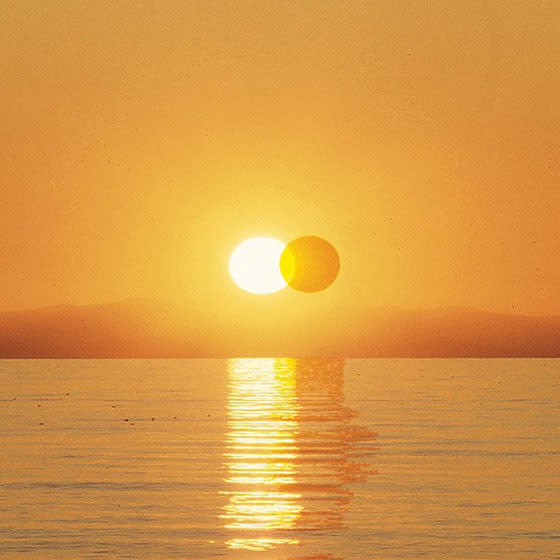The Backhomes' latest record is a celebration of electric noise, at moments akin to melodic lightning caught in a tornado. The psychedelia is rampant throughout, and like a long and strange acid trip, the vibrant sounds on Tidalwave are often disorienting.
The Montreal-founded, now BC-based duo of musician Kees Dekker and visual artist Aimée van Drimmelen have found a loose groove on their sophomore LP, one that was recorded entirely within their living room in Victoria. The nine-song collection is a synth and reverb exploration that sometimes verges on being incomprehensible. Yet Tidalwave's bewildering qualities are also central to listening experience characterized by an exuberant collage of tightly wound frequencies that are engaging because of their uncompromising direction, even when they don't hit their mark entirely.
The harmonica-driven blues on "Save Me" is an example of the duo taking advantage of their strengths. The chord progression is overlaid by a "When the Levee Breaks"-style harmonica lead, and Dekker sings powerfully through a reverb-y microphone. Things get muddled when Dekker relegates himself to droning tones, as is the case on opening tracks "That's All" and "Solid Gold." The latter half of the album is where Dekker explores his range, most notably on the acoustic-led "Rays" and the noisy, reverb-heavy "One More Time."
Dekker's guitar never slacks on the record, and "The Chase" and "Tidalwave" find themselves sonically echoing Edge's signature feedback gain and tremolo style. But the wah-wah guitar pedals on tracks like "Solid Gold," despite being confident choices, become exhausting due to their repetition and lack of arc throughout many of the compositions, especially on instrumental tracks "Chaco" and "Pre-Utopian."
The free-flowing jam band framework of Tidalwave can be refreshing, but at times the Backhomes' easy-going, flexible nature allows too many sounds to join the fray, which only gets worse as the phrases repeat. However, having proved their ability to draw from an endless well of sound, it will be interesting to see if the Backhomes can further articulate their vision on their next effort.
(Independent)The Montreal-founded, now BC-based duo of musician Kees Dekker and visual artist Aimée van Drimmelen have found a loose groove on their sophomore LP, one that was recorded entirely within their living room in Victoria. The nine-song collection is a synth and reverb exploration that sometimes verges on being incomprehensible. Yet Tidalwave's bewildering qualities are also central to listening experience characterized by an exuberant collage of tightly wound frequencies that are engaging because of their uncompromising direction, even when they don't hit their mark entirely.
The harmonica-driven blues on "Save Me" is an example of the duo taking advantage of their strengths. The chord progression is overlaid by a "When the Levee Breaks"-style harmonica lead, and Dekker sings powerfully through a reverb-y microphone. Things get muddled when Dekker relegates himself to droning tones, as is the case on opening tracks "That's All" and "Solid Gold." The latter half of the album is where Dekker explores his range, most notably on the acoustic-led "Rays" and the noisy, reverb-heavy "One More Time."
Dekker's guitar never slacks on the record, and "The Chase" and "Tidalwave" find themselves sonically echoing Edge's signature feedback gain and tremolo style. But the wah-wah guitar pedals on tracks like "Solid Gold," despite being confident choices, become exhausting due to their repetition and lack of arc throughout many of the compositions, especially on instrumental tracks "Chaco" and "Pre-Utopian."
The free-flowing jam band framework of Tidalwave can be refreshing, but at times the Backhomes' easy-going, flexible nature allows too many sounds to join the fray, which only gets worse as the phrases repeat. However, having proved their ability to draw from an endless well of sound, it will be interesting to see if the Backhomes can further articulate their vision on their next effort.
